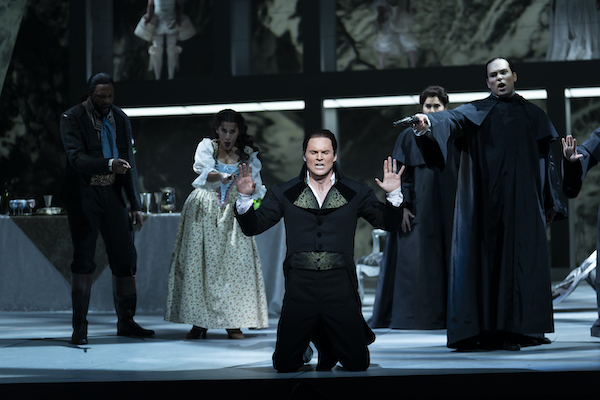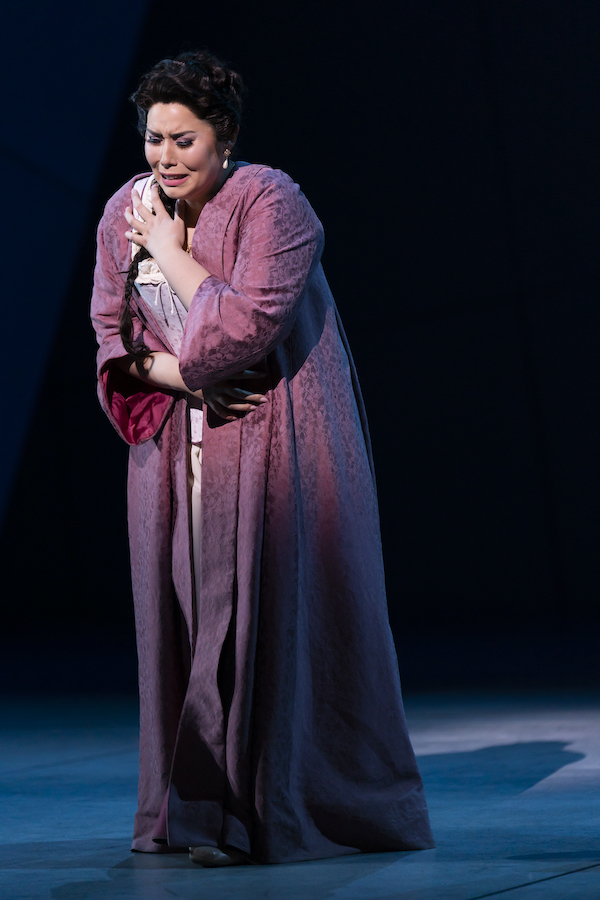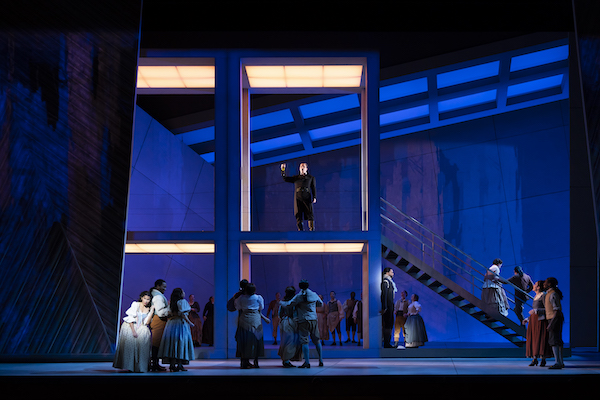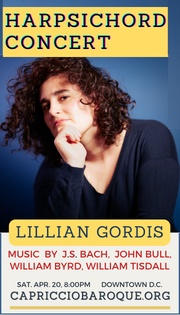WNO delivers fine singing, #MeToo overtones in “Don Giovanni”

The title character of Mozart’s Don Giovanni seduces women with lies. Sometimes he wields his wealth and prestige to push them to succumb, and his powerful social position strengthens his word over that of his accusers.
Director E. Loren Meeker explored the opera’s contemporary, #MeToo implications in her new production for Washington National Opera, which opened Saturday night in the Kennedy Center Opera House.
Baritone Ryan McKinny sang the title role with considerable finesse. His best moment came in the delicately spun “Deh, vieni alla finestra,” accompanied by Neil Gladd’s mandolin from the pit. Meeker’s direction made it clear that the character was falling apart, often appearing visibly drunk, taking regular swigs from a wine bottle during the Champagne Aria, for example. McKinny lacked only the last degree of vocal power to make his rages terrifying.

The sensation of the cast was the Donna Anna of Arizona-born soprano Vanessa Vasquez in a scintillating WNO debut. Her voice projected with a clarion tone and precise intonation, other than one wild detour near the end of the prayer trio. But this was singing more about subtlety than sheer power, making for a triumphant rendition of “Non mi dir” in Act II, with upward high flourishes both transparent and transporting.
Keri Alkema was all acidic edge as Donna Elvira. In her big aria in Act II, “Mi tradì quell’alma ingrata,” Alkema lacked pinpoint accuracy in the fast passages, but the tone was incisive and plangent. Tenor Alek Shrader seemed in less than optimal voice as Don Ottavio, his voice cracking on a few entrances. His volume level was generally too soft, and high notes often did not come into focus.
Among the best voices on the male side of the cast was the resonant Leporello of bass-baritone Kyle Ketelsen, whose exquisite comic timing was sometimes compromised by a tendency to rush ahead of the orchestra. Bass Peter Volpe rumbled with vengeful authority as the Commendatore, a luxuriant voice audiences will also hear in WNO’s concurrent run of Samson et Dalila.
Younger singers made their mark: first and foremost, soprano Vanessa Becerra as a comely Zerlina. Her active vibrato obscured the accuracy of pitch, but her characterization of a wide-eyed ingenue suited the role. Baritone Norman Garrett, a recent alumnus of WNO’s Domingo-Cafritz Young Artists program, partnered her as a pleasing, angry Masetto.
Evan Rogister, the company’s young principal conductor, had trouble keeping complex passages together in this magnificent score, especially the Act I finale with its overlapping time signatures. His hand gestures often did not line up with his bobbing head or rocking shoulders, seeming to create confusion between platform and pit. This uncertainty caused some misalignments in ensembles and in the otherwise accomplished singing of the capable WNO Chorus.
Meeker’s production is a chronological hodgepodge. The costumes, originally designed decades ago by Jean-Pierre Ponnelle, placed the characters firmly in the 18th century (with additional costumes designed by Lynly A. Saunders). The action unfolded on a modern, industrial set of girders, stainless steel railings, and fluorescent lights, designed by Erhard Rom. (It will also serve as the backdrop for Samson et Dalila, running in repertory with Don Giovanni.) Projections and colored light gave the walls the appearance of veined, colored marble or other materials (lighting by Robert Wierzel).
From the second part of the Overture, Meeker has added a group of women as supernumeraries, who appear throughout the opera. Arranged on the two-level set at the start like dolls on a shelf, they are young and old, tall and short, costumed as wealthy aristocrats or poor servants. In other words, they recall the description of Don Giovanni’s appetite for all types of women in the Catalogue Aria. Costumed in white, moving slowly and remaining expressionless, they haunted the action like Don Giovanni’s phantom regrets.
When the Commendatore returned at the end of Act II, he was costumed like them in white. As he sang, the women circled menacingly, some of them holding musical instruments and backing Don Giovanni up a slanted, broken dinner table. Hell-like flames were projected on the white walls (projections by S. Katy Tucker), although Don Giovanni seemed to be killed by a falling chandelier.
At the end of the Act II finale, Meeker has Donna Anna, Donna Elvira, and Zerlina—the three women who have accused Don Giovanni of sexual misconduct—join hands at center stage and exchange a satisfied laugh. Mozart and his librettist, Lorenzo da Ponte, after all leave no doubt as to the guilt of their antihero.
In the last lines of Act II the other six characters sing the moral of the opera: “Such is the end of those who do evil, / and the death of deceivers is always matched to their life.” If only all resolutions were so just in real life.
Don Giovanni runs through March 22. kennedy-center.org; 202-467-4600









Posted Mar 01, 2020 at 9:31 pm by Greg Capaldini
Indeed, Miss Vasquez was a joyful discovery. At the end where her character told her fiancé that she wish to wait longer before marrying, the singer’s solidity and polish made the decision seem to come from a position of strength instead of girlish caprice. I had no problem with the mix of period costumes and modern set design – in fact, I was charmed.
As for the conductor, I wonder if he was trying to bring little-house, period-performance fleetness to a big-house production. And I can’t resist mentioning a credit among the artistic staff that, though unable to explain why, I found hilarious: Fight Director and Intimacy Coach. Don’t get me wrong, that person’s fine work was in evidence, but the job title sounds like a millenial euphemism for a marriage counselor.
Posted Mar 09, 2020 at 12:43 am by Alan Fisher
Alek Shrader may have been miscast as Don Ottavio. This was the first time we have seen Don Giovanni in which the company cut Ottavio’s most famous aria (Il Mio Tesoro) — but the cut was understandable at the Sunday matinee (March 8).